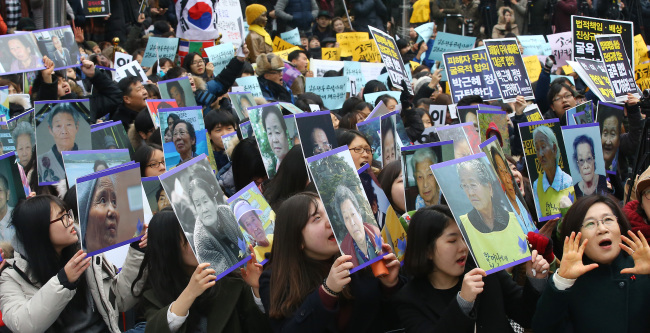Two days after the breakthrough on the sex slavery issue, Korea faces a double whammy of mounting Japanese efforts to dilute the agreement and eroding public and political support at home.
 |
Participants hold up pictures of victims of Japan`s WWII sexual slavery during a weekly rally held near the statue of a girl representing comfort women adjacent to a construction site of the Japanese Embassy building in central Seoul, Wednesday. (Yonhap) |
Seoul’s ongoing effort to appease the victims is being branded as a belated face-saving bid, with many of the former “comfort women” pledging not to take any funds from the deal, and the main opposition party declaring its invalidity citing the lack of parliamentary endorsement.
On the diplomatic front, the Foreign Ministry is also struggling to fend off Tokyo’s massive media-play and officials’ remarks undercutting their obligation.
On Wednesday, the ultraright daily Sankei Shimbun reported that Japanese Prime Minister Shinzo Abe has declared an end to the sex slavery row and warned Korea not to raise the issue again, putting a damper over the settlement and sparking doubts about his sincerity toward what he called a heartfelt apology.
The report said during conversations with his aides, Abe made it clear that he would never again mention the issue, not even at his next summit with President Park Geun-hye.
“I mentioned it during my phone conversations (with Park on Monday). It was all over yesterday. No more apologies,” he was quoted as saying.
“This time Korea’s foreign minister stated the deal is irreversible before TV cameras, which was then valued by the U.S. ... Now that things have come to this pass, if Korea breaks its promise, it is over as a member of the international community.”
The remarks immediately prompted criticism in Korea for undermining the hard-won compromise even before the ink dried.
Under the agreement, Abe conceded the government’s responsibility for the Japanese military’s sexual enslavement of Korean women during World War II, offering an “atonement and apology from his heart” and 1 billion yen ($8.1 million) with which Seoul will set up a foundation to help the victims “recover their honor and dignity and heal scars in their minds.”
In another attempt to water down the deal, Japanese news outlets also churned out reports that Seoul showed a “positive reaction” to Tokyo’s demand that a bronze statue installed in front of the Japanese Embassy here to represent comfort women be removed before the money is provided.
Foreign Minister Yun Byung-se warned Japan against “any words and actions that could create any misunderstanding.”
Seoul officials dismissed the claim that it gave a positive response as “fabricated,” reaffirming Yun’s comment during a news conference with Japanese Foreign Minister Fumio Kishida on Monday that he would try to “properly resolve” Tokyo’s demand through consultations with related civic groups.
“Faithful and swift implementation of the agreement is vital. I hope that it will offer a chance for the two sides to build trust and create a virtuous cycle,” he told reporters on Wednesday.
The news reports, which Seoul officials deem a rampant media campaign, add to increasingly sour domestic sentiment due chiefly to their failure to discuss in advance with the victims and seek their understanding.
Opposition lawmakers are also raising voices against a settlement, taking issue with the lack of Tokyo’s compensation based on its legal responsibility, as well as consultations with the Assembly.
Minjoo Party of Korea chairman Rep. Moon Jae-in called the deal void on Wednesday as his party members joined a rally in support of the victims.
“This agreement constitutes a relinquishment of our people‘s rights. … We oppose it and declare invalid given the absence of the assembly’s consent,” he said at a meeting of senior party members.
“No one, not even the president, but only the victims who have been living in pain all their lives are entitled to speak of ‘final’ and ‘irreversible.’ We are stifled by the president for asking for their understanding (by agreeing to the deal) at a time when she should hold the perpetrators legally responsible and demand an apology and compensation.”
By Shin Hyon-hee (
heeshin@heraldcorp.com)








